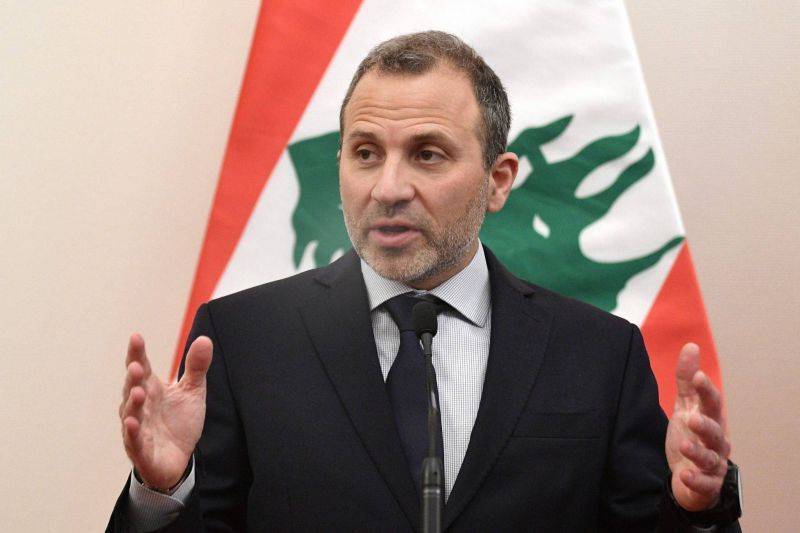
Without directly calling on Kurdahi to resign, Bassil said that such a step would allow to “get over the pretext” of these diplomatic tensions. (Credit: AFP)
BEIRUT — The head of the Free Patriotic Movement Gebran Bassil pleaded Friday that a “necessary” distinction be made between the positions taken by Hezbollah and those of the Lebanese state, especially in light of the diplomatic crisis that broke out with several Gulf countries, including Saudi Arabia, in late October.
Polemical remarks by the Lebanese Information Minister George Kurdahi on Riyadh’s role in the Yemen war were at the origin of this crisis.
Without directly calling on Kurdahi to resign, Bassil said that such a step would allow to “get over the pretext” of these diplomatic tensions.
In an interview published Friday in the columns of the Kuwaiti daily al-Qabas, the leader of the FPM said he “wants to maintain the best relations with the Gulf countries, especially Saudi Arabia,” recalling that the head of state Michel Aoun (a long-time ally of Hezbollah) had broken the tradition and visited Riyadh for his first official trip following his election in October 2016. It is traditional for Lebanese presidents to make their first trip to France, but Aoun visited Riyadh in January 2017 before going to Paris.
The Syrian conflict and the war in Yemen
The FPM leader also spoke in favor of a policy that would keep Lebanon away from regional conflicts, especially between Saudi Arabia and Iran, and not a policy of “neutrality,” contending that this neutrality is not possible because of the crises that Lebanon is going through, especially that of Syrian refugees, which require it to deal with Damascus.
“Non-intervention in the internal affairs of countries preserves the historical role of Lebanon,” he said. “We cannot distance ourselves from the Syrian conflict, but we can distance ourselves from the war in Yemen,” he added, as his party’s ally Hezbollah announced that it was involved in this war alongside the Iranian-backed Houthi rebels.
In an interview recorded before he took office in Najib Mikati’s cabinet, George Kurdahi had called the war in Yemen “absurd” and criticized the role of Riyadh in the conflict. These words launched a serious diplomatic crisis. At the end of October, several Gulf monarchies took retaliatory measures against Lebanon, including Saudi Arabia, which recalled its ambassador and stopped imports from Lebanon, a country whose economic and financial system has been in crisis for over two years.
Kuwait had also sent back Lebanese diplomats and recalled its ambassador, before tightening the conditions for obtaining visas and renewing residence permits for Lebanese.
In remarks broadcast after the beginning of this crisis, the head of Saudi diplomacy also on several occasions linked the decisions of the Gulf countries not only to the position of Kurdahi but also to the rise of the pro-Iranian Hezbollah on the Lebanese political scene.
In this regard, Bassil wondered whether Saudi Arabia could be satisfied with asking Lebanon to “distance itself” or if the kingdom would instead like stronger decisions from Lebanon.
“Why mix Hezbollah’s position with that of official Lebanon,” the former foreign minister wondered, before considering it “essential to separate these two positions.”
"Making us assume responsibility for the position of a Lebanese party aggravates the problem,” Bassil said, calling at the same time for a distinction to be made between the positions of Hezbollah and those of the FPM. “We have an agreement [known as Mar Mikhael and concluded in 2006] but we do not agree on all issues,” Bassil said, specifying that the intervention of the Shiite party in regional conflicts, including Syria, is part of these points on which the two parties differ. “I think Iran can act in Yemen without needing Hezbollah,” he added.
Kuwait initiative
”It is important to relaunch the dialogue for good relations with the Gulf countries, and to avoid going where we do not want,” the FPM head said, calling on Kuwait to launch an initiative within this framework and adding, “we are ready to collaborate on it.”
Finally, to a question about the possible resignation of Kurdahi in the wake of the diplomatic crisis, Bassil responded by stressing that the minister’s statements “were only the pretext” that triggered the crisis, “especially since several senior officials have made statements along the same lines, without this provoking a Saudi reaction.”
He also noted that the head of Saudi diplomacy had clearly stated that the crisis exceeds the words of a minister.
"In my opinion, the resignation could allow us to get past this pretext," he said, calling on Kurdahi to follow the example of Charbel Wehbe, former foreign minister. Last May, Wehbe was relieved of his duties after he accused Saudi Arabia of financing terrorist groups.